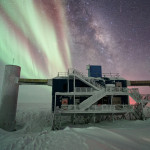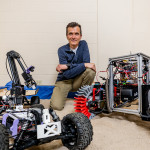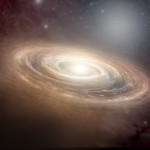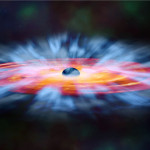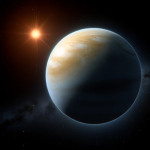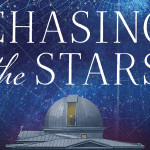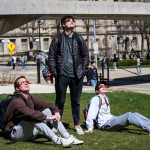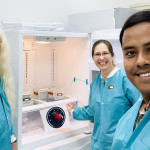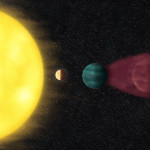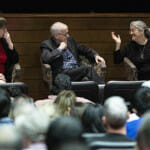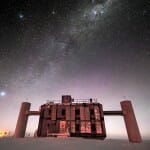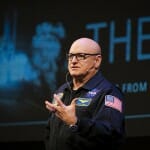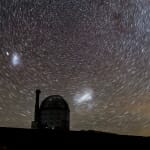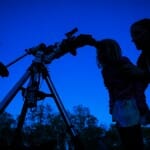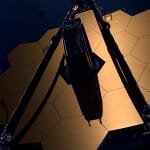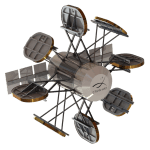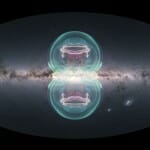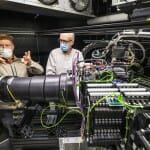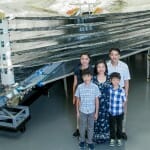Tag Space and astronomy
IceCube Neutrino Observatory gets a major upgrade beneath the ice
The project ensures that UW–Madison’s efforts at IceCube remain at the forefront of neutrino astronomy for years to come.
Robotic space rovers keep getting stuck. UW engineers have figured out why.
The researchers’ discovery resulted from their work on a NASA-funded project to simulate the VIPER rover, which had been planned for a lunar mission.
Measuring gases around young stars, astronomers unlock major clues to planet formation
UW–Madison astronomers and international collaborators have produced the most accurate measurement of the gases swirling around young stars and their changing mass over time. The discovery offers clues to how different types of planets form.
Watery planets orbiting dead stars may be good candidates for studying life — if they can survive long enough
The small footprint and dim light of white dwarfs, remnants of stars that have burned through their fuel, may make excellent backdrops for studying planets with enough water to harbor life.
Wind from black holes may influence development of surrounding galaxies
The discovery helps illuminate the way active black holes can continuously shape their galaxies by spurring on or snuffing out the development of new stars.
Small, cool and sulfurous exoplanet may help write recipe for planetary formation
UW–Madison astronomers and their collaborators hope the discovery of one exoplanet's sulfurous atmosphere will advance our understanding of how planets forms.
A new history brings to life people, places and innovations of Wisconsin astronomy
A new book, Chasing the Stars: How the Astronomers of Observatory Hill Transformed Our Understanding of the Universe traces the history of astronomy in Wisconsin and at UW–Madison, beginning with the Indigenous mound builders through the construction of Washburn Observatory to the present day, bringing to life the people, places and innovations that have made Wisconsin an important contributor to our understanding of the universe.
Eclipse throws shade, delighting campus
Hundreds crowded Library Mall Monday afternoon to peer up at a rare solar eclipse, as the UW–Madison Astronomy Club hosted a live viewing event from noon to 3:30 p.m.
These tomatoes are out of this world… or they will be soon
By sending tomato plants to the International Space Station, UW researchers hope to better understand how plants grow without gravity and whether there are ways to help plants cope with the stressors involved with growing in space flight.
Earth-sized planet discovered in ‘our solar backyard’
A team of astronomers have discovered a planet closer and younger than any other Earth-sized world yet identified. It’s a remarkably hot world whose proximity to our own planet and to a star like our sun mark it as a unique opportunity to study how planets evolve.
UW–Madison researchers key in revealing neutrinos emanating from galactic neighbor with a gigantic black hole
The astrophysical neutrinos coming from a Milky Way neighbor hold promise for future astronomical discoveries.
NASA Astronaut Scott Kelly speaks at UW on his Year in Space
Retired NASA astronaut Scott Kelly spoke to a nearly full house at Memorial Union on Oct. 4 about his year in space, one day reaching the red planet and the importance of endurance through adversity.
Decades of work at UW–Madison underpin discovery of corona protecting Milky Way’s neighboring galaxies
Astronomers at UW–Madison used light from quasars across 28 galaxies to illuminate a corona of warm gases mediating a trail of gaseous debris left by the Large and Small Magellanic Clouds, two dwarf galaxies orbiting the Milky Way.
Universe in the Park
Away from the glare of city lights, under dark skies in our state parks, UW–Madison's Astronomy Department presents "Universe in the Park" at locations throughout Wisconsin during the summer months.
Space telescope ‘a little like a time machine’
Assistant professor Michael Maseda was one of many who contributed to development of the James Webb Space Telescope. He looks forward to using the instrument to take “baby pictures of galaxies” — potentially looking as far back into the history of the universe as the Big Bang itself.
Scientists, undergraduates team up to protect astronauts from radiation
A research team will refine and test a novel idea for a traveling magnetic field strong enough to deflect harmful radiation from astronauts as they travel to Mars or set up bases around the moon.
UW-built instrument will enhance views of distant galaxies
A near-infrared spectrograph, which splits light into its individual colors to form a rainbow-like spectrum, will soon be shipped to South Africa from UW–Madison. Custom-built here by staff in the Washburn Astronomical Laboratories, it will expand the capabilities of the Southern African Large Telescope.
UW alum helped pack James Webb telescope for space travel
Wei-Di Cheng, a 1993 engineering graduate, analyzed mechanical ground systems to propose, design, fabricate, test and deliver ground systems to support spacecraft and payload integration.

